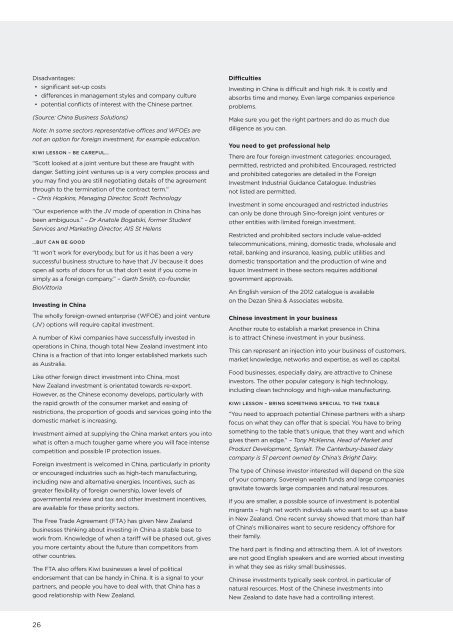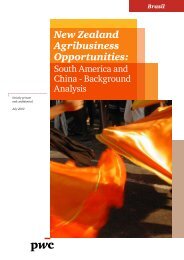Navigating China Guide (2012) - New Zealand Trade and Enterprise
Navigating China Guide (2012) - New Zealand Trade and Enterprise
Navigating China Guide (2012) - New Zealand Trade and Enterprise
Create successful ePaper yourself
Turn your PDF publications into a flip-book with our unique Google optimized e-Paper software.
Disadvantages:<br />
• significant set-up costs<br />
• differences in management styles <strong>and</strong> company culture<br />
• potential conflicts of interest with the Chinese partner.<br />
(Source: <strong>China</strong> Business Solutions)<br />
Note: In some sectors representative offices <strong>and</strong> WFOEs are<br />
not an option for foreign investment, for example education.<br />
KIWI LESSON – BE CAREFUL…<br />
“Scott looked at a joint venture but these are fraught with<br />
danger. Setting joint ventures up is a very complex process <strong>and</strong><br />
you may find you are still negotiating details of the agreement<br />
through to the termination of the contract term.”<br />
– Chris Hopkins, Managing Director, Scott Technology<br />
“Our experience with the JV mode of operation in <strong>China</strong> has<br />
been ambiguous.” – Dr Anatole Bogatski, former Student<br />
Services <strong>and</strong> Marketing Director, AIS St Helens<br />
…BUT CAN BE GOOD<br />
“It won’t work for everybody, but for us it has been a very<br />
successful business structure to have that JV because it does<br />
open all sorts of doors for us that don’t exist if you come in<br />
simply as a foreign company.” – Garth Smith, co-founder,<br />
BioVittoria<br />
Investing in <strong>China</strong><br />
The wholly foreign-owned enterprise (WFOE) <strong>and</strong> joint venture<br />
(JV) options will require capital investment.<br />
A number of Kiwi companies have successfully invested in<br />
operations in <strong>China</strong>, though total <strong>New</strong> <strong>Zeal<strong>and</strong></strong> investment into<br />
<strong>China</strong> is a fraction of that into longer established markets such<br />
as Australia.<br />
Like other foreign direct investment into <strong>China</strong>, most<br />
<strong>New</strong> <strong>Zeal<strong>and</strong></strong> investment is orientated towards re-export.<br />
However, as the Chinese economy develops, particularly with<br />
the rapid growth of the consumer market <strong>and</strong> easing of<br />
restrictions, the proportion of goods <strong>and</strong> services going into the<br />
domestic market is increasing.<br />
Investment aimed at supplying the <strong>China</strong> market enters you into<br />
what is often a much tougher game where you will face intense<br />
competition <strong>and</strong> possible IP protection issues.<br />
Foreign investment is welcomed in <strong>China</strong>, particularly in priority<br />
or encouraged industries such as high-tech manufacturing,<br />
including new <strong>and</strong> alternative energies. Incentives, such as<br />
greater flexibility of foreign ownership, lower levels of<br />
governmental review <strong>and</strong> tax <strong>and</strong> other investment incentives,<br />
are available for these priority sectors.<br />
The Free <strong>Trade</strong> Agreement (FTA) has given <strong>New</strong> <strong>Zeal<strong>and</strong></strong><br />
businesses thinking about investing in <strong>China</strong> a stable base to<br />
work from. Knowledge of when a tariff will be phased out, gives<br />
you more certainty about the future than competitors from<br />
other countries.<br />
The FTA also offers Kiwi businesses a level of political<br />
endorsement that can be h<strong>and</strong>y in <strong>China</strong>. It is a signal to your<br />
partners, <strong>and</strong> people you have to deal with, that <strong>China</strong> has a<br />
good relationship with <strong>New</strong> <strong>Zeal<strong>and</strong></strong>.<br />
Difficulties<br />
Investing in <strong>China</strong> is difficult <strong>and</strong> high risk. It is costly <strong>and</strong><br />
absorbs time <strong>and</strong> money. Even large companies experience<br />
problems.<br />
Make sure you get the right partners <strong>and</strong> do as much due<br />
diligence as you can.<br />
You need to get professional help<br />
There are four foreign investment categories: encouraged,<br />
permitted, restricted <strong>and</strong> prohibited. Encouraged, restricted<br />
<strong>and</strong> prohibited categories are detailed in the Foreign<br />
Investment Industrial Guidance Catalogue. Industries<br />
not listed are permitted.<br />
Investment in some encouraged <strong>and</strong> restricted industries<br />
can only be done through Sino-foreign joint ventures or<br />
other entities with limited foreign investment.<br />
Restricted <strong>and</strong> prohibited sectors include value-added<br />
telecommunications, mining, domestic trade, wholesale <strong>and</strong><br />
retail, banking <strong>and</strong> insurance, leasing, public utilities <strong>and</strong><br />
domestic transportation <strong>and</strong> the production of wine <strong>and</strong><br />
liquor. Investment in these sectors requires additional<br />
government approvals.<br />
An English version of the <strong>2012</strong> catalogue is available<br />
on the Dezan Shira & Associates website.<br />
Chinese investment in your business<br />
Another route to establish a market presence in <strong>China</strong><br />
is to attract Chinese investment in your business.<br />
This can represent an injection into your business of customers,<br />
market knowledge, networks <strong>and</strong> expertise, as well as capital.<br />
Food businesses, especially dairy, are attractive to Chinese<br />
investors. The other popular category is high technology,<br />
including clean technology <strong>and</strong> high-value manufacturing.<br />
KIWI LESSON – BRING SOMETHING SPECIAL TO THE TABLE<br />
“You need to approach potential Chinese partners with a sharp<br />
focus on what they can offer that is special. You have to bring<br />
something to the table that’s unique, that they want <strong>and</strong> which<br />
gives them an edge.” – Tony McKenna, Head of Market <strong>and</strong><br />
Product Development, Synlait. The Canterbury-based dairy<br />
company is 51 percent owned by <strong>China</strong>’s Bright Dairy.<br />
The type of Chinese investor interested will depend on the size<br />
of your company. Sovereign wealth funds <strong>and</strong> large companies<br />
gravitate towards large companies <strong>and</strong> natural resources.<br />
If you are smaller, a possible source of investment is potential<br />
migrants – high net worth individuals who want to set up a base<br />
in <strong>New</strong> <strong>Zeal<strong>and</strong></strong>. One recent survey showed that more than half<br />
of <strong>China</strong>’s millionaires want to secure residency offshore for<br />
their family.<br />
The hard part is finding <strong>and</strong> attracting them. A lot of investors<br />
are not good English speakers <strong>and</strong> are worried about investing<br />
in what they see as risky small businesses.<br />
Chinese investments typically seek control, in particular of<br />
natural resources. Most of the Chinese investments into<br />
<strong>New</strong> <strong>Zeal<strong>and</strong></strong> to date have had a controlling interest.<br />
26
















